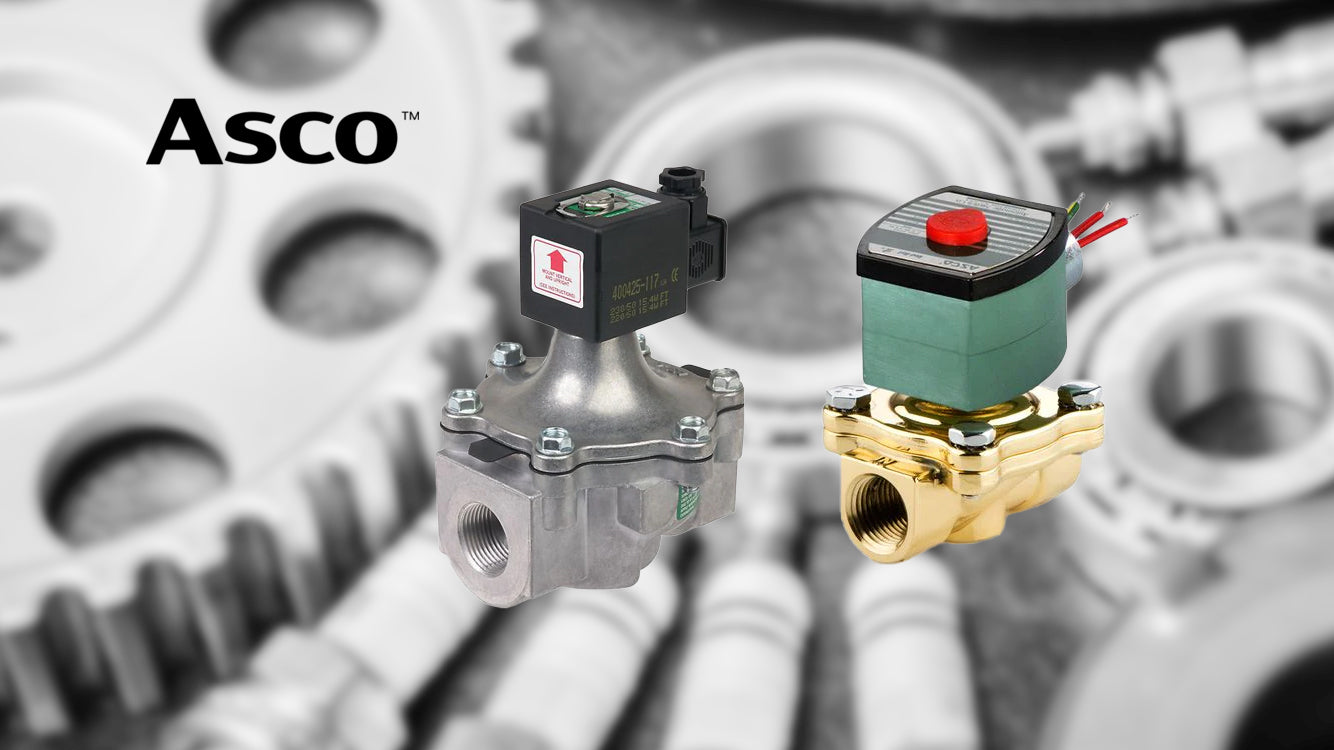In automotive parts manufacturing, fluid handling is everywhere. From coolant and hydraulic fluid to aggressive cleaners and specialty chemicals, the right flow control is essential for quality, safety, and uptime. But not all fluids are created equal—and neither are the valves that control them.
Choosing the wrong valve material can lead to corrosion, leaks, premature failures, and costly downtime. That’s why ASCO solenoid valves, available in a range of advanced materials, are a top choice for manufacturers looking to keep their lines running smoothly—even when faced with the harshest fluids.
The Challenge: Aggressive Fluids in Automotive Manufacturing
Automotive plants use a wide variety of fluids, many of which are corrosive or chemically aggressive. Common examples include:
- Coolants and cutting fluids for CNC machining
- Solvents and degreasers for cleaning parts
- Acids and alkaline solutions in surface treatment or paint shops
- Brake and transmission fluids in testing and assembly
- Wastewater containing a mix of chemicals and particulates
These fluids can attack standard valve materials, causing pitting, swelling, or even complete valve failure. The result? Leaks, contamination, unplanned shutdowns, and increased maintenance costs.
Material Matters: Matching ASCO Valve Construction to Fluid Type
ASCO solenoid valves are engineered with a range of body and seal materials to withstand aggressive media. Here’s how to choose the right one for your application:
1. Stainless Steel for Corrosive and Hygienic Applications
Stainless steel valves are ideal for fluids that would quickly corrode brass or aluminum. They offer excellent resistance to acids, alkalis, and solvents—making them perfect for paint shops, chemical dosing, and high-purity water systems.
2. PTFE (Teflon) and Engineered Polymers for Extreme Chemical Compatibility
For the harshest chemicals, PTFE-lined or all-polymer valves provide unmatched resistance. These are a smart choice for aggressive cleaners, strong acids, or bases used in surface treatment lines.
3. Brass and Bronze for Oils and Non-Aggressive Fluids
For hydraulic oils, compressed air, and non-corrosive fluids, brass or bronze valves offer durability and cost-effectiveness. They’re widely used in lubrication and pneumatic systems throughout automotive plants.
4. Elastomer Seals: Choosing the Right Soft Parts
The valve body isn’t the only thing that matters. Seals and diaphragms must also be compatible with your fluid. ASCO offers a range of seal materials, including:
- EPDM: Great for water, steam, and some chemicals
- Viton® (FKM): Excellent for oils, fuels, and many solvents
- PTFE: Chemically inert for extreme applications
- Buna-N (NBR): Good for general-purpose oils and air
Best Practices: Selecting and Maintaining Valves for Harsh Media
- Know Your Fluid: Always check the chemical compatibility of both the valve body and seal materials with your process fluid. ASCO provides compatibility charts to help you make the right choice.
- Consider Temperature and Pressure: Some materials perform better at high temperatures or pressures. Stainless steel and PTFE, for example, maintain integrity where plastics may fail.
- Plan for Maintenance: Even with the right material, aggressive media can shorten service life. Choose valves with easy access for inspection and replacement of seals.
- Monitor for Early Warning Signs: Watch for leaks, sticking, or changes in valve performance—these can indicate material incompatibility or wear.
Why ASCO Solenoid Valves?
ASCO is a leader in fluid automation, offering solenoid valves in a vast array of materials and configurations. Their valves are engineered for reliability, easy maintenance, and long service life—even in the most demanding automotive environments. With options for stainless steel, PTFE, engineered polymers, and a wide range of elastomers, there’s an ASCO valve for every fluid challenge.
Conclusion
In automotive manufacturing, the cost of valve failure goes far beyond the price of a replacement part. It can mean lost production, contaminated product, and expensive cleanups. By selecting the right ASCO valve materials for your harshest fluids, you can keep your lines running, your workers safe, and your costs under control.
At HMFT, we help manufacturers specify and supply the ideal ASCO valves for every application. If you’re facing challenges with aggressive fluids or frequent valve failures, contact us today—we’ll help you find a solution that lasts.
FAQ
1. How do I know which valve material is best for my application?
Check your fluid’s chemical compatibility with available valve body and seal materials. ASCO provides detailed charts, or you can consult with HMFT for expert guidance.
2. What are signs that a valve is being attacked by aggressive media?
Look for leaks, swelling, pitting, or sticking operation. These are early indicators of material incompatibility.
3. Can I retrofit existing systems with more resistant ASCO valves?
Yes! Many ASCO valves are designed for easy drop-in replacement. Upgrading to more resistant materials can dramatically improve system reliability.
4. How often should valves be inspected in harsh chemical service?
Inspection frequency depends on fluid aggressiveness and operating conditions, but regular checks—monthly or quarterly—are recommended for critical applications.
5. Are there ASCO valves for high-temperature or high-pressure fluids?
Absolutely. Stainless steel and PTFE valves from ASCO are engineered for demanding temperature and pressure requirements in automotive manufacturing.

